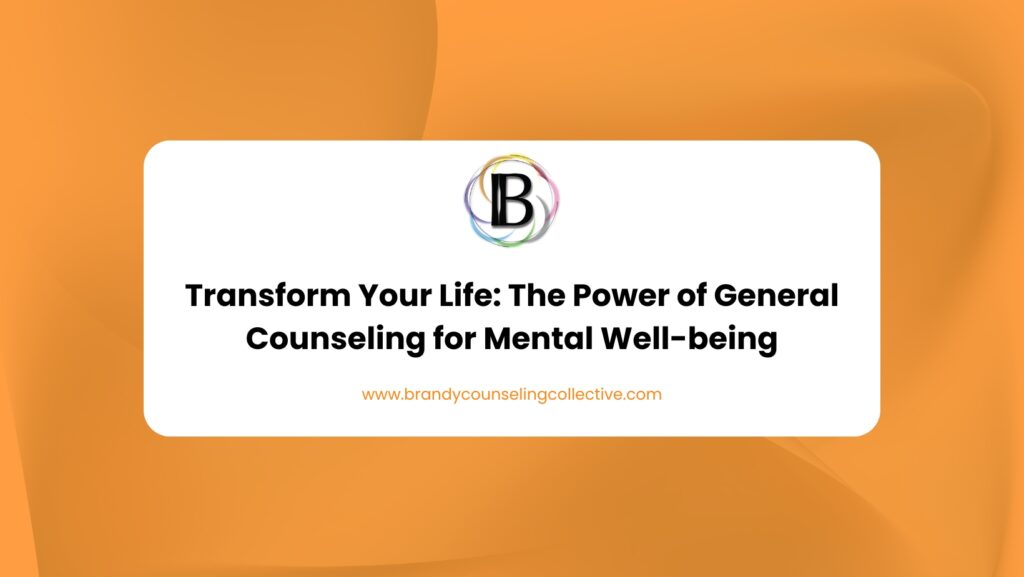Mental well-being is an essential aspect of overall health, influencing how individuals think, feel, and act. It affects how we handle stress, relate to others, and make choices. In today’s fast-paced world, maintaining mental well-being can be challenging, leading many to seek professional help through mental well-being counseling services. General counseling offers a broad range of mental health support for individuals dealing with various issues, from everyday stress to more severe mental health conditions. This blog explores the scope and counseling benefits of general counseling services for mental well-being.
Understanding General Counseling
General counseling is a type of therapy aimed at helping individuals navigate life’s challenges and improve their mental health. It involves working with trained mental health counselors who provide a safe and confidential environment to explore thoughts, feelings, and behaviors. The goal is to develop coping strategies, improve emotional regulation, and enhance overall well-being.
Key Areas Addressed in General Counseling
Stress Management
Life can be stressful, and everyone experiences stress differently. Counselors help individuals identify stressors and develop effective stress management techniques to reduce anxiety and improve daily functioning.
Anxiety and Depression
These are two of the most common mental health issues. Counseling provides a space to discuss these feelings openly and develop strategies to manage symptoms, including cognitive-behavioral techniques and mindfulness practices.
Relationship Issues
Relationships are a significant part of life, and conflicts are inevitable. Counselors assist individuals and couples in improving communication, resolving conflicts, and building healthier relationships.
Grief and Loss
Losing a loved one is a profound experience that can affect mental health. Counseling offers support through the grieving process, helping individuals cope with loss and find ways to move forward.
Self-Esteem and Confidence
Low self-esteem can impact various aspects of life. Counselors work with individuals to build self-confidence, self-worth, and a positive self-image.
Life Transitions
Major life changes, such as moving, changing jobs, or retiring, can be challenging. Counseling helps individuals navigate these transitions and adjust to new circumstances.
Trauma and PTSD
Traumatic experiences can have long-lasting effects on mental health. Counselors provide a safe space to process trauma and develop strategies to manage post-traumatic stress disorder (PTSD) symptoms.
Benefits of General Counseling
Engaging in counseling can bring numerous benefits, significantly enhancing mental well-being. Here are some key advantages:
- Improved Emotional Health: Counseling helps individuals understand and manage their emotions better. By exploring feelings in a safe environment, clients can gain insight into their emotional responses and learn healthier ways to express and cope with emotions.
- Better Stress Management: Life’s demands can be overwhelming. Counseling provides tools and techniques to manage stress effectively, reducing anxiety and promoting relaxation. This can lead to better physical health, as chronic stress is linked to numerous health problems.
- Enhanced Relationships: Whether it’s family, romantic, or work relationships, counseling can improve communication skills, resolve conflicts, and strengthen connections. Learning to express oneself clearly and listen actively can transform relationships positively.
- Increased Self-Awareness: Counseling encourages self-exploration, helping individuals understand themselves better. This increased self-awareness can lead to personal growth, improved decision-making, and a greater sense of purpose.
- Coping with Life Changes: Life is full of changes, some of which can be difficult to handle. Counseling provides support during transitions, helping individuals adapt and find new ways to cope with change.
- Healing from Trauma: Trauma can have a profound impact on mental health. Counseling offers a space to process traumatic experiences, develop coping mechanisms, and work towards healing.
- Better Mental Health: Overall, counseling promotes better mental health by addressing a range of issues and providing ongoing support. It can prevent the escalation of mental health problems and improve quality of life.
Types of Counseling Approaches
General counseling encompasses various therapeutic approaches, each tailored to meet the specific needs of clients. Some common approaches include:
Cognitive Behavioral Therapy (CBT)
CBT is a widely used approach that focuses on identifying and changing negative thought patterns and behaviors. It is effective for treating anxiety, depression, and other mental health issues.
Psychodynamic Therapy
This approach explores the influence of the past on present behavior. By understanding unconscious patterns, individuals can gain insight into their actions and emotions.
Humanistic Therapy
Humanistic therapy emphasizes personal growth and self-actualization. It focuses on the individual’s potential and encourages self-exploration and self-acceptance.
Solution-Focused Brief Therapy (SFBT)
SFBT is a goal-oriented approach that focuses on finding solutions to current problems. It is often used for short-term counseling and is effective in helping clients achieve specific goals.
Mindfulness-Based Therapy
This approach incorporates mindfulness practices to help individuals stay present and manage stress. It is effective for reducing anxiety and improving emotional regulation.
Integrative Therapy
Integrative therapy combines elements from different therapeutic approaches to meet the unique needs of each client. It is flexible and adaptable, allowing counselors to provide personalized care.
Seeking Counseling: What to Expect
Deciding to seek mental health counseling is a significant step towards improving mental well-being. Here’s what individuals can expect when they start the counseling process:
- Initial Assessment: The first session typically involves an initial assessment where the counselor gathers information about the client’s background, current issues, and goals for therapy. This helps in creating a tailored treatment plan.
- Building a Therapeutic Relationship: A strong therapeutic relationship is crucial for effective counseling. Trust and rapport are built over time, creating a safe space for open and honest communication.
- Regular Sessions: Counseling involves regular sessions, usually weekly or bi-weekly, depending on the client’s needs. Each session provides an opportunity to explore issues, develop coping strategies, and track progress.
- Active Participation: Successful counseling requires active participation from the client. This includes being open and honest, completing any homework or exercises assigned by the counselor, and applying new skills in everyday life.
- Ongoing Evaluation: Throughout the counseling process, progress is regularly evaluated. This ensures that the treatment plan remains effective and can be adjusted as needed.
General counseling services play a vital role in promoting mental well-being. By addressing a wide range of issues and providing tailored support, counseling helps individuals navigate life’s challenges and improve their quality of life.
Whether dealing with stress, anxiety, relationship issues, or trauma, counseling offers valuable tools and insights for personal growth and emotional health.
If you’re facing difficulties or simply want to enhance your mental well-being, consider reaching out to a professional counselor. Taking that first step can lead to profound and lasting positive changes in your life.
Incorporating Mental Health Resources and Services
In addition to individual counseling, there are numerous mental health resources available. Mental health services often include support for substance abuse, eating disorders, and other mental health disorders. Access to health insurance and primary care providers can facilitate comprehensive mental health treatment. Family members and friends can also play a critical role in supporting loved ones through mental health challenges.
By understanding and utilizing the available mental health resources, individuals can find the support they need to navigate their mental health journeys effectively. Mental health counseling, combined with a strong support network, can make a significant difference in achieving and maintaining mental well-being.
Transform Your Life with Brandy Counseling Collective
Are you ready to enhance your mental well-being and navigate life’s challenges with confidence? At Brandy Counseling Collective, we offer comprehensive general counseling services designed to support your mental health and overall well-being.
Our experienced mental health counselors provide a safe, confidential space to explore your thoughts, feelings, and behaviors, helping you develop effective coping strategies and achieve personal growth.
Whether you’re dealing with stress, anxiety, relationship issues, or trauma, our tailored counseling approaches can make a profound difference in your life. Take the first step towards a healthier, happier you.
Contact Brandy Counseling Collective today to learn more and schedule a consultation.


